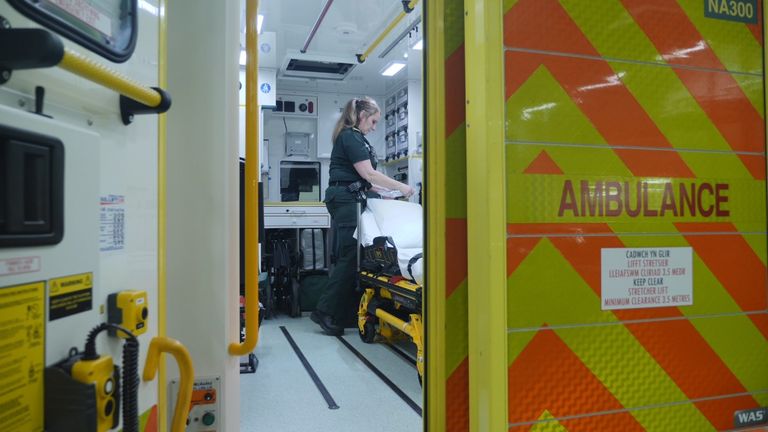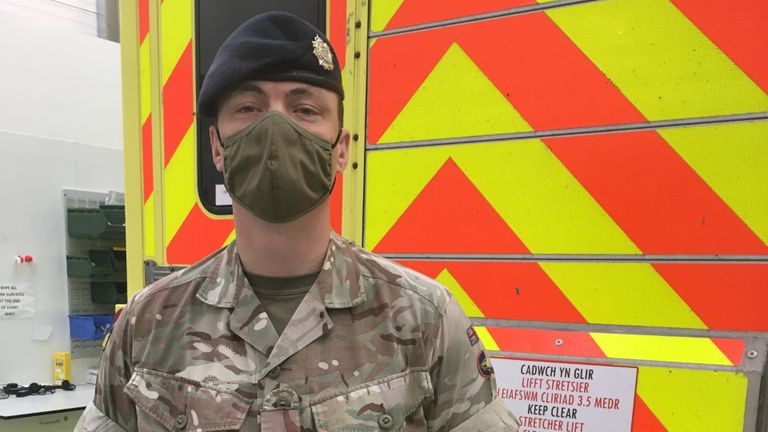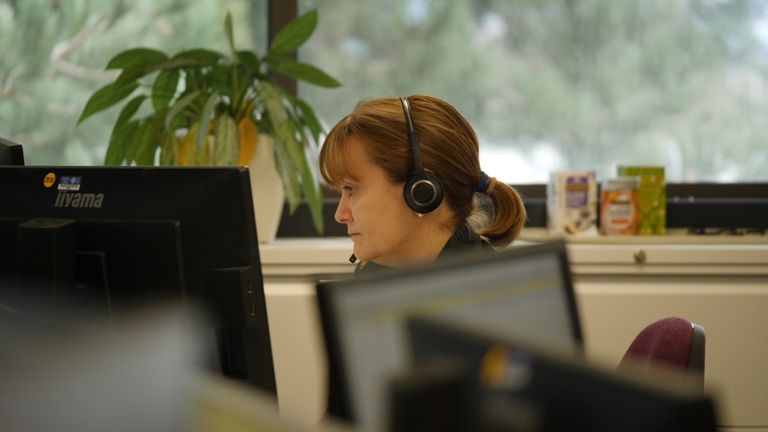COVID-19: Emergency coronavirus calls are slowing but wave of poor mental health is taking off
Let’s start with the good news. COVID cases are gradually slowing down; they’ve become just another part of a shift for the paramedics in North Wales and the rest of the UK.
The Welsh Ambulance Service still has 89 soldiers helping them through the end of the winter peak but the COVID calls are usually now straightforward.
What is new, however, is the growing wave of mental health problems that have come as a consequence of the pandemic and life in lockdown.
“We can go whole shifts where that’s all we deal with,” 22-year-old paramedic Kieran McClelland told us.
Kieran has only been doing this job for 18 months, but like all his colleagues he has risen to face the challenge of their professional lives.
“It’s taken its toll, all of this,” he said as we waited to drop off another patient at Wrexham’s A&E department.
Ambulance crews have always had to deal with people with complex mental health problems, but the view from this frontline is that it has grown drastically during the winter lockdown.
We were soon called to a young woman who had been found collapsed in the street by a team of road maintenance workers.
The paramedics quickly established she had taken an overdose after hearing that her dad had died from COVID-19 the night before.
In the back of the ambulance, the young woman grew agitated, prompting the team to calmly flick on the blue lights and get her quickly back to Maelor hospital.
Once there, the on-site security team were ready to help escort her inside, but she refused to go with them. It took almost an hour for security, along with the ambulance crew and two police officers, to gently coax her in for specialist help.
Careful reassurance from emergency medical technician Vicki Moran meant nobody was hurt in the process, and the patient got to safety – a good result in the circumstances.
“We are getting a lot of mental health jobs at the moment where people just aren’t coping with the situation,” Vicki said.
“It is sad… we’ve seen more suicides and people trying to take their own life; it’s tricky, but we always do our absolute best to help.
“We are all going through this in different ways… my family worry about me, probably more than I worry about it.”
The army, who are still supporting the effort across Wales, see soldiers paired up with paramedics to help them cope with staff shortages and demand.
Private Jason Perkins, from the Royal Logistics Corp who has been on this deployment since Christmas, told Sky News: “It’s been extreme; some of the calls you get too are hard to understand.
“It has opened my eyes quite a lot when you’re in these ambulances going to these houses seeing what it has done to them that’s quite bad.
“We try to help them in whatever way we can… there are people on the edge but we try to give them the reassurance – I’m not trained really for this but we try to get them help.”
“We are not heroes or nothing like that, we are just here to help our colleagues in the ambulance service and do the job we need to do.”
It’s the same picture in the relative calm of the control centres that handle emergency and non-emergency calls across Wales.
Ruth Lander, who is part of the training team for the non-emergency 111 service in North Wales, told Sky News: “What we perceive as straightforward symptoms, even something like a sore throat, even those calls are coming through with mental health issues.
“People are anxious and they are scared, and that’s the benefit of this service because we can explain and help those patients.
“It has definitely increased the mental health aspects to the calls we get – they may be elderly and struggling with loneliness or a young mum who has lost her support network and is struggling.”
Across the desks, her colleague Lynne Ryan said: “You just want to be able to hug some of the people who are on the calls.”
The 111 service has lost four staff members to COVID; the funeral of one colleague was taking place as we were speaking to some of the team.
“It’s hard,” Lynne added. “Everyone has a story or someone they know and we see the fallout of that on these calls every shift.”
Mental health support across the UK has undeniably improved in recent years, and while public awareness has also increased, the chief executive of the Welsh Ambulance Service believes the full effects of lockdown are only just emerging.
Jason Killens said: “We expect these problems to increase and for them to become even more complex as people suffer different stresses in their lives across our communities.
“Everyone has been touched by the pandemic in some way – many people have lost their jobs, of course, and that creates anxiety and mental health problems too.
“There is increasing recognition over recent years that mental health needs parity with physical health in terms of how we provide services and care for patients.
“We have got a small number of mental health clinicians within our service and we expect to expand that this year… we realise there is more that we can do and that we can do better.”
Subscribe to the Daily podcast on Apple Podcasts, Google Podcasts, Spotify, Spreaker
As the day shift came to an end in Wrexham, Andy Powell and Mal Evans, who decontaminate the vehicles after COVID jobs, were starting their meticulous wipe downs.
Every item is taken out of every bag whether it has been used or not, and then it’s scrubbed down. The cleaning of just one vehicle takes the team at least an hour-and-a-half.
They do it on auto-pilot now but it’s the kind of vital work that holds it all together. If COVID is there on a kit bag you can wipe it away – but the effects of the disease have spread to every community and are so much harder to deal with.
Anyone feeling emotionally distressed or suicidal can call Samaritans for help on 116 123 or email [email protected] in the UK. In the US, call the Samaritans branch in your area or 1 (800) 273-TALK
Source: Read Full Article








